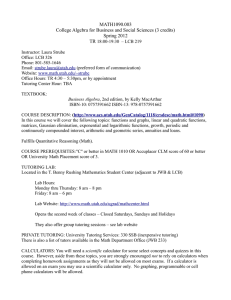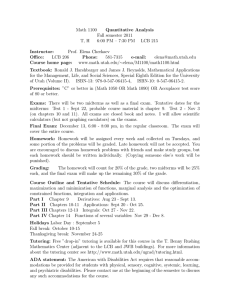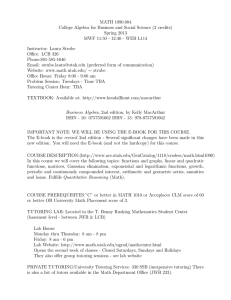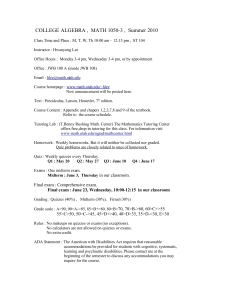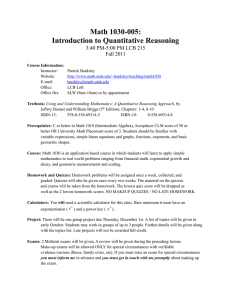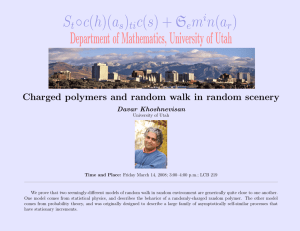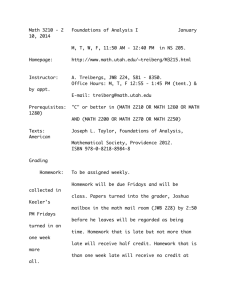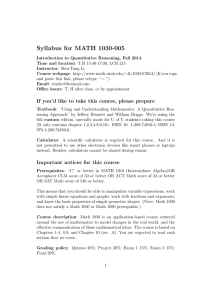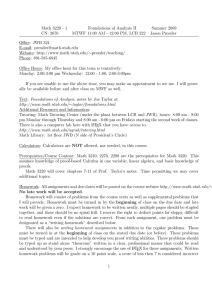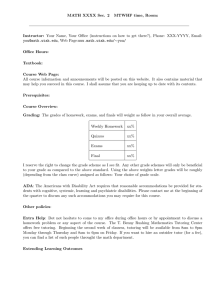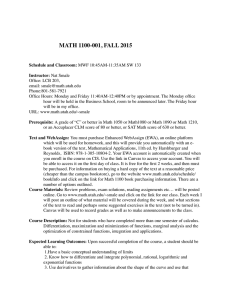MATH1090.008 College Algebra for Business and Social Sciences (3 credits) Fall 2012 TR
advertisement
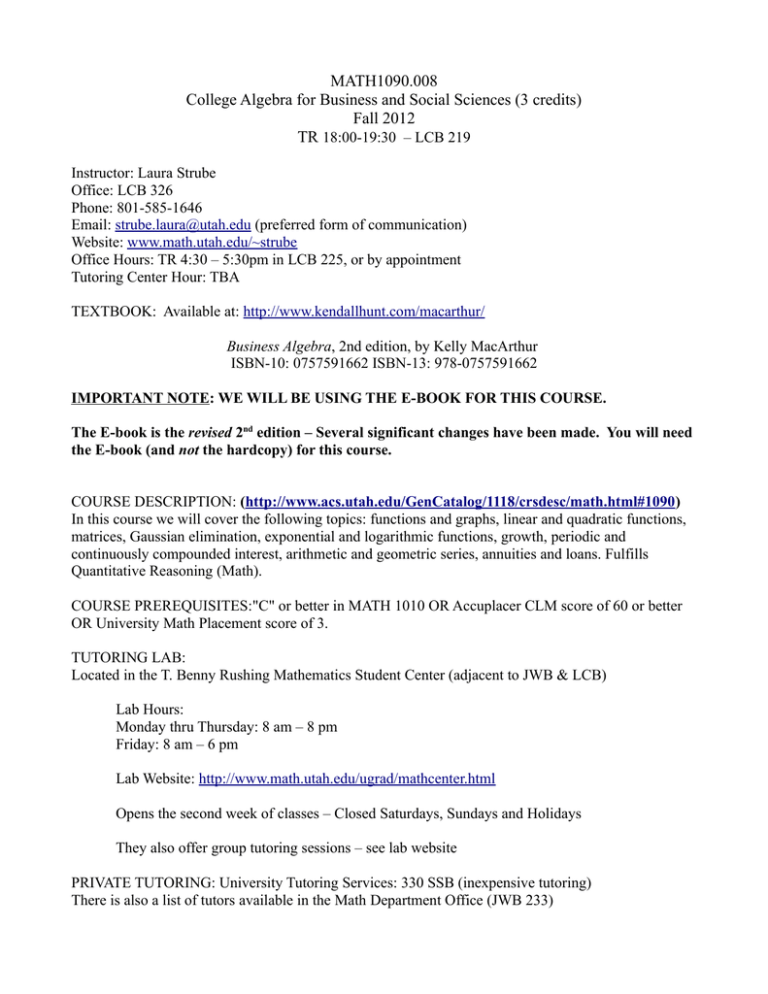
MATH1090.008 College Algebra for Business and Social Sciences (3 credits) Fall 2012 TR 18:00-19:30 – LCB 219 Instructor: Laura Strube Office: LCB 326 Phone: 801-585-1646 Email: strube.laura@utah.edu (preferred form of communication) Website: www.math.utah.edu/~strube Office Hours: TR 4:30 – 5:30pm in LCB 225, or by appointment Tutoring Center Hour: TBA TEXTBOOK: Available at: http://www.kendallhunt.com/macarthur/ Business Algebra, 2nd edition, by Kelly MacArthur ISBN-10: 0757591662 ISBN-13: 978-0757591662 IMPORTANT NOTE: WE WILL BE USING THE E-BOOK FOR THIS COURSE. The E-book is the revised 2nd edition – Several significant changes have been made. You will need the E-book (and not the hardcopy) for this course. COURSE DESCRIPTION: (http://www.acs.utah.edu/GenCatalog/1118/crsdesc/math.html#1090) In this course we will cover the following topics: functions and graphs, linear and quadratic functions, matrices, Gaussian elimination, exponential and logarithmic functions, growth, periodic and continuously compounded interest, arithmetic and geometric series, annuities and loans. Fulfills Quantitative Reasoning (Math). COURSE PREREQUISITES:"C" or better in MATH 1010 OR Accuplacer CLM score of 60 or better OR University Math Placement score of 3. TUTORING LAB: Located in the T. Benny Rushing Mathematics Student Center (adjacent to JWB & LCB) Lab Hours: Monday thru Thursday: 8 am – 8 pm Friday: 8 am – 6 pm Lab Website: http://www.math.utah.edu/ugrad/mathcenter.html Opens the second week of classes – Closed Saturdays, Sundays and Holidays They also offer group tutoring sessions – see lab website PRIVATE TUTORING: University Tutoring Services: 330 SSB (inexpensive tutoring) There is also a list of tutors available in the Math Department Office (JWB 233) CALCULATORS: You will need a scientific calculator for the final exam as well as some select concepts in this course. However, aside from these topics, you are strongly encouraged not to rely on calculators when completing homework assignments as they will not be allowed on most exams. If a calculator is allowed on an exam you may use a scientific calculator only. No graphing, programmable or cell phone calculators will be allowed. GRADING: Grades will be posted on the Canvas page for this course (which may be accessed through your CIS account) and will be calculated as follows: Twice-Weekly Homework 15% Quizzes 15% Midterms (each) 20% Final 30% GRADING SCALE: It is unlikely that the grades for this course will be curved. The standard grade distribution is as follows: A 93 - 100 A- 90 - 92 B+ 87 - 89 B 83 - 86 B- 80-82 C+ 77-79 C 73 -76 C- 70-72 D+ 67 - 69 D 63-66 D- 60-62 E 0 - 59 TEACHING PHILOSOPHY: As a mathematics PhD student who both hated and struggled with math as a child, it is my firm belief that every student has the capacity to learn new and challenging concepts provided they learn to study in a way compatible with their learning style. It is my goal as an instructor to present new concepts in a clear, well-illustrated manner and to provide a supportive environment in which students can gain the skills necessary to become a confident mathematics student. HOMEWORK: Between 24 and 28 assignments will be given over the course of the semester and will be assigned on the course web page after every lecture. Each Assignment will consist of two parts: Part A and Part B. Part A will be a completion assignment and will be given a score of 0, 5 or 10. Part B will be graded for correctness on a scale from 0 – 10 points. Assignments will be due in class one week after they are assigned. Late homework will not be accepted. However, you will be given 5 “drops” - that is, I will drop your 5 lowest homework grades at the end of the semester. These “drops” are yours to use however you wish – use them wisely. If for some reason you anticipate being unable to attend class, you may turn in your assignment early by 6pm on the day it is due- by leaving it on my desk or slipping it under my office (LCB 326) door. You may also submit a scanned pdf of your homework via email: strube.laura@utah.edu . All homework must adhere to the guidelines described in the document Homework Guidelines attached to this syllabus. Failure to follow these guidelines will result in a reduction of your homework grade. QUIZZES: There will be three quizzes during the semester. Quiz 1: Thursday, 20 September 2012 Quiz 2: Tuesday, 6 November 2012 Quiz 3: Tuesday, 4 December 2012 MIDTERMS: You will be required to show your ID at both midterms. There will be two midterms during the semester. Midterm 1: Thursday, 4 October 2012 Midterm 2: Tuesday, 20 November 2012 In general there will be no alternate exams or quizzes given. Exceptions to this policy include University scheduled events such as sports games (for athletes only), religious holidays, and serious unavoidable emergencies (death in the immediate family, car accident etc.). Oversleeping, work schedule, family social event etc. will not be sufficient reason for a make up exam. Those with scheduled reasons to miss an exam – University sponsored events or religious holidays only – must notify me of their schedule as soon as possible and no later than Tuesday, 4 September 2012. Failure to do so may result in a zero on missed exams. If you have an unexpected emergency at the time of a midterm, you must notify my ASAP. Failure to notify me before the exam begins will be sufficient reason for me to give you zero on the exam. I reserve the right to make alternate exams more difficult that scheduled exams and to require documentation supporting your reason for missing the exam (doctor's note etc.). Be aware that contacting me after having missed an exam will significantly reduce the probability that I will give you a make up exam. FINAL EXAM: The final exam will be comprehensive. You will be required to show your ID at the final exam. There will be absolutely no make-ups for the final exam. The final exam date and time as determined by the University (http://registrar.utah.edu/academic-calendars/final-exams-fall2012.php) is: Tuesday, 11 December 6:00pm – 8:00pm CLASS POLICIES: (1) You will be required to show your ID at all examinations. (2) Computers will not be allowed during lecture. In general it is very difficult to take notes for a math course using a computer and the potential distraction to yourself and to the students around you outweighs any benefits you might have by using one. (3) You will be required to show your ID at all examinations. (4) No late homework will be accepted (5) You will be expected to treat this course, your classmates and your instructor with respect. This means that you should come to class prepared to learn, refrain from texting, chatting with your neighbors, reading magazines, and any other disruptive behavior during class. Failure to behave in a respectful manner will not be tolerated . (6) Cursing or ranting on homework, quizzes, exams, or verbally in class will result in a deduction of the corresponding grade and may result in a zero on the assignment/quiz. If you are having trouble with an assignment please come to my office hours. I would be more than happy to help you with any concepts that you find confusing. (7) Cell Phones – must be turned off or set to vibrate for the duration of the class. (8) Email – You need to have an email address registered with the Campus Information System. I will send announcements via email on a regular basis and you will be responsible for any information communicated in this manner. (9) If you have crisis-level extenuating circumstances that require flexibility it is your responsibility to contact me. The longer you wait to discuss your situation with me the less likely I will be able or willing to help. (10) Cheating and Academic Misconduct – Cheating will not be tolerated and will result in a zero on the assignment/quiz/exam in question and in severe cases will result in a failing grade for the course. From the Student Code: (http://www.regulations.utah.edu/academics/6-400.html) Academic Misconduct “A student who engages in academic misconduct as defined in Part I.B. may be subject to academic sanctions including but not limited to a grade reduction, failing grade, probation, suspension or dismissal from the program or the University, or revocation of the student’s degree or certificate. Sanctions may also include community service, a written reprimand, and/or a written statement of misconduct that can be put into an appropriate record maintained for purposes of the profession or discipline for which the student is preparing.” “Academic misconduct” includes, but is not limited to, cheating, misrepresenting one's work, inappropriately collaborating, plagiarism, and fabrication or falsification of information, as defined further below. It also includes facilitating academic misconduct by intentionally helping or attempting to help another to commit an act of academic misconduct. 1. “Cheating” involves the unauthorized possession or use of information, materials, notes, study aids, or other devices in any academic exercise, or the unauthorized communication with another person during such an exercise. Common examples of cheating include, but are not limited to, copying from another student's examination, submitting work for an in-class exam that has been prepared in advance, violating rules governing the administration of exams, having another person take an exam, altering one's work after the work has been returned and before resubmitting it, or violating any rules relating to academic conduct of a course or program. 2. Misrepresenting one's work includes, but is not limited to, representing material prepared by another as one's own work, or submitting the same work in more than one course without prior permission of both faculty members. 3. “Plagiarism” means the intentional unacknowledged use or incorporation of any other person's work in, or as a basis for, one's own work offered for academic consideration or credit or for public presentation. Plagiarism includes, but is not limited to, representing as one's own, without attribution, any other individual’s words, phrasing, ideas, sequence of ideas, information or any other mode or content of expression. (11) Students with Disabilites – (http://disability.utah.edu) The University of Utah seeks to provide equal access to its programs, services and activities for people with disabilities. If you will need accommodations in the class, reasonable prior notice needs to be given to the Center for Disability Services, 162 Olpin Union Building, 5815020 (V/TDD). CDS will work with you and the instructor to make arrangements for accommodations. All written information in this course can be made available in alternative format with prior notification to the Center for Disability Services. ----This syllabus is subject to change and may be revised at the instructors discretion. All such changes will be made in writing on the course website and students will be notified via email. Students are responsible for any syllabus revisions communicated in this manner. ----
